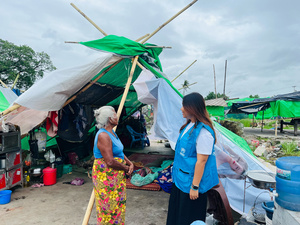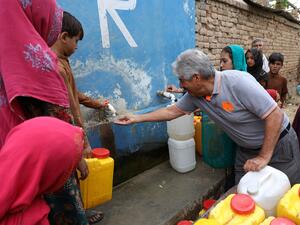Quake survivors share concerns, hopes with UNHCR deputy chief
Quake survivors share concerns, hopes with UNHCR deputy chief

UNHCR Deputy High Commissioner Wendy Chamberlin (left) talking to earthquake survivors in Thori Park camp in Muzaffarabad.
MUZAFFARABAD, Pakistan, April 18 (UNHCR) - UNHCR Deputy High Commissioner Wendy Chamberlin started her six-day mission to Pakistan over the weekend with a visit to the earthquake-affected areas, where survivors told her about their concerns and hopes for return.
Chamberlin, a former US ambassador to Pakistan, is making her first visit to the country since becoming UNHCR's Deputy High Commissioner in 2004. She arrived in Islamabad on Sunday and immediately proceeded by road towards Muzaffarabad, the provincial capital of Pakistan-administered Kashmir (AJK).
The three-and-a-half-hour drive took her to the Neelum Valley, commonly known as the "crushed valley", where she got a first-hand look at the level of destruction caused by the quake's landslides. Once considered one of the area's natural wonderlands, the valley is now scarred by white gashes on mountainsides where the land slipped away. The nearby river was blocked by the slides, but cleared within 24 hours by the Pakistan army working through the night.
Visiting Muzaffarabad's relief camps, the Deputy High Commissioner was eager to learn from the survivors about their life in the camps and their hopes for the immediate future, while they revelled in her use of Urdu when greeting them.
In Jalalabad Park camp, Chamberlin spoke to the head of the women's committees and two families who were scheduled to leave the camp the next day about their views on return.
"What UNHCR wants is what the quake survivors want for themselves. They want to go home to their villages," she said later. "We are working with various agencies like IOM (International Organization for Migration) to facilitate transport and return."
Six months after the earthquake, those affected have begun returning home. More than 88,000 camp dwellers have gone back to rebuild in the last month, including more than 27,000 from Muzaffarabad.
In Thori Park camp, the Deputy High Commissioner discussed challenges in the affected areas with quake survivors, government officials and aid workers. A group of young women and widows told her their main concerns were the availability of land, road rehabilitation, and shelter in their villages.
UNHCR has always stressed that those returning must go voluntarily and with full knowledge of what they will face. The agency launched a mass information campaign in the camps last month and is working with its implementing partners to ensure that details on conditions in areas of return and expected assistance for shelter reconstruction reach the people so they can make an informed choice on return. In Muzaffarabad, UNHCR disseminated mass information material in some 79 camps within four days.
The refugee agency has also emphasised that provision must be made for vulnerable people who cannot return now. Some have been orphaned, widowed or disabled; others have lost their land or come from towns like Balakot, which lies on major fault lines and has to be relocated. These vulnerable people will need continued assistance until more permanent solutions are found.
The authorities in Muzaffarabad have set aside at least two camps - Thori Park and Mera Tanolia - for these residual groups. Another three camps have been designated as residual camps in North-West Frontier Province. UNHCR is providing resources and training to the civilian authorities - Regional Relief Coordinator (RRC) and Camp Management Organisation (CMO) - to help them manage and assist those who remain in these camps.
"We need to support and build the capacity of local NGOs to meet the challenging future when it comes to reconstruction," CMO's Deputy Commissioner Liakat Chaudry told Chamberlin.
The Deputy High Commissioner later assured: "UNHCR will continue to assist in the transitional phase, however, the long-term response will fall to other agencies."
As lead agency for camp management in this operation, UNHCR has supported the Pakistani government in running the temporary camps set up for earthquake survivors. With 132 emergency staff, and 55 mobile teams funded by the European Commission for Humanitarian Affairs (ECHO) and UK's Department for International Development (DFID), the agency is currently assisting Pakistani authorities in 112 relief camps for some 73,000 quake survivors.
By Fatma Bassiouni in Muzaffarabad, Pakistan









